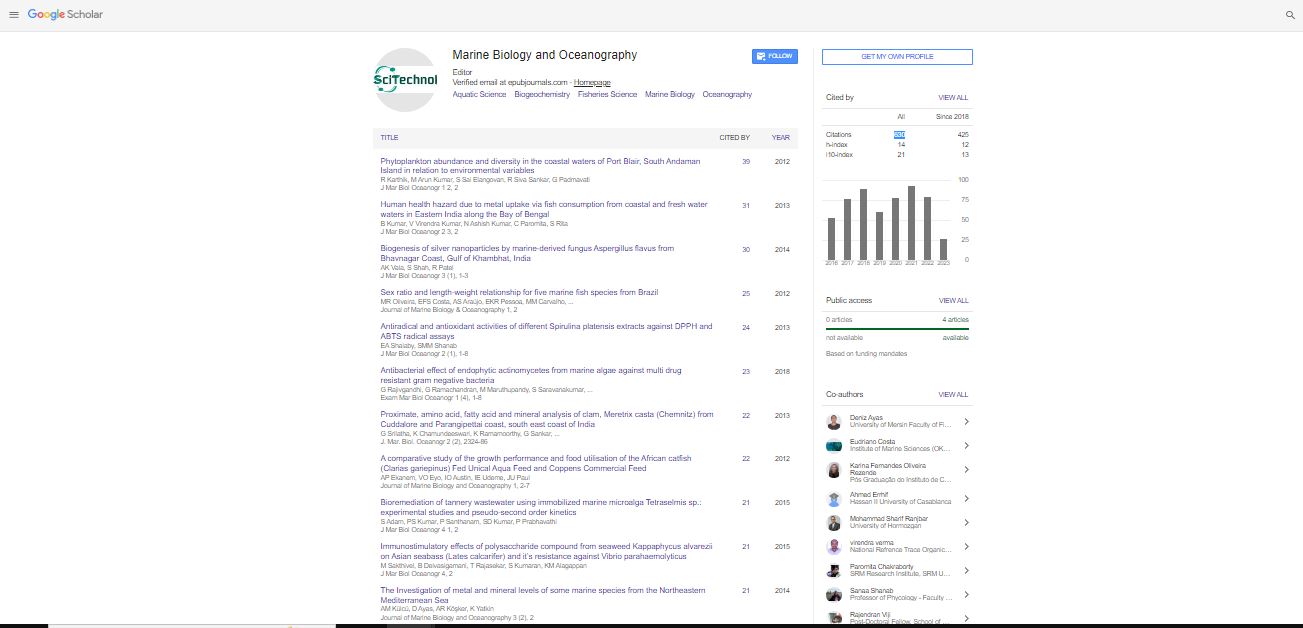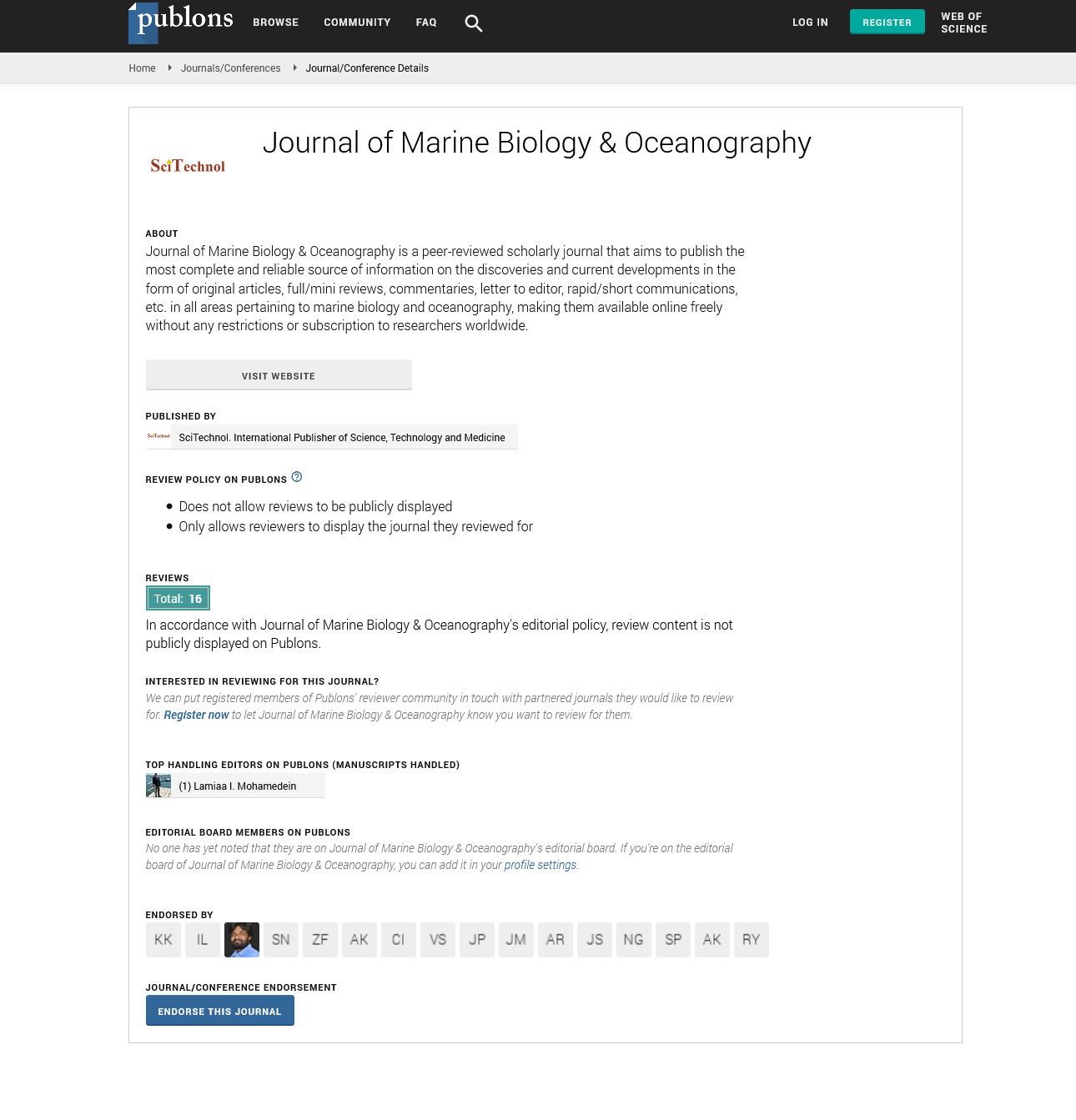Perspective, J Mar Biol Oceanogr Vol: 12 Issue: 1
Impact of Oceans on Humans: Exploring Applications of Ocean Science
Juan Varona*
Department of Physics and Astronomy, University of Southampton, Southampton, UK
*Corresponding Author: Juan Varona
Juan Varona, Department of Physics and Astronomy, University of Southampton, Southampton, UK;
E-mail: juanvarona@usn.uk
Received date: 14 February, 2023, Manuscript No. JMBO-23-95375;
Editor assigned date: 16 February, 2023, PreQC No. JMBO-23-95375 (PQ);
Reviewed date: 03 March, 2023, QC No. JMBO-23-95375;
Revised date: 10 March, 2023, Manuscript No. JMBO-23-95375 (R);
Published date: 20 March, 2023, DOI: 10.4172/2324-8661.1000253.
Citation: Varona J (2023) Impact of Oceans on Humans: Exploring Applications of Ocean Science. J Mar Biol Oceanogr 12:1.
Abstract
Keywords: Aquaculture, Overfishing, Oceans, Cyclone
Description
The world's oceans, covering more than 70% of the Earth’s surface, plays a major role in supporting human life and livelihoods. Oceans influence weather patterns, regulate climate, provide food and resources, and offer recreational and cultural opportunities. The study of oceans, known as ocean science or oceanography, has led to important insights into the impact of oceans on humans and has resulted in various applications that benefit society in numerous ways. One of the key areas where oceans have a significant impact on humans is climate regulation. Oceans act as a heat sink, absorbing and storing large amounts of heat from the atmosphere. They also act as a carbon sink, absorbing and storing carbon dioxide from the atmosphere. This helps in mitigating the impacts of climate change by regulating temperature and carbon cycling. Understanding the physical and chemical processes that govern the interactions between the atmosphere and the ocean is essential in predicting and managing climate change. Oceans also play a vital role in supporting global food security. Fisheries and aquaculture, which rely on the resources of the ocean, provide a significant source of protein and other essential nutrients to millions of people around the world. Ocean science provides insights into the distribution, abundance, and sustainability of marine resources, helping in the management and conservation of fisheries and aquaculture practices. This includes studying the biology, ecology, and behavior of marine organisms, as well as monitoring and predicting changes in marine ecosystems, such as the impacts of overfishing, habitat degradation, and climate change on marine resources. The oceans are also a source of energy for human use. Renewable energy sources from the ocean, such as offshore wind, wave, tidal, and thermal energy, have the potential to contribute to the global energy mix and reduce dependence on fossil fuels. Ocean science plays a key role in understanding the availability, variability, and impacts of these renewable energy sources, as well as in developing technologies for their sustainable utilization. In addition to these direct applications, oceans also have indirect impacts on humans through their influence on weather and climate. Oceans are a major cause of weather patterns, including hurricanes, cyclones, and monsoons, which can have significant impacts on human populations, infrastructure, and economies. Understanding the dynamics of oceanatmosphere interactions and their impacts on weather patterns is important for predicting and managing extreme weather events and their associated risks.
Conclusion
The oceans have a profound impact on humans, influencing climate, providing food and resources, supporting energy production, offering economic and cultural opportunities, and shaping human cultures and societies. Ocean science plays a vital role in understanding the complex interactions between oceans and humans, and developing applications that benefit society. From physical oceanography to biological oceanography, from renewable energy to marine pollution management, and from remote sensing to autonomous underwater vehicles, ocean science has led to significant advancements in the understanding of the oceans and their impact on humans.
 Spanish
Spanish  Chinese
Chinese  Russian
Russian  German
German  French
French  Japanese
Japanese  Portuguese
Portuguese  Hindi
Hindi 
